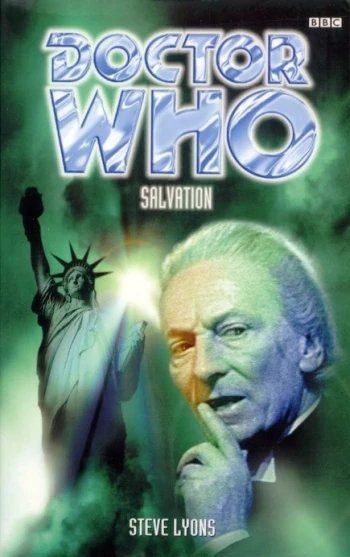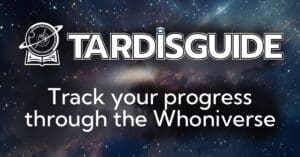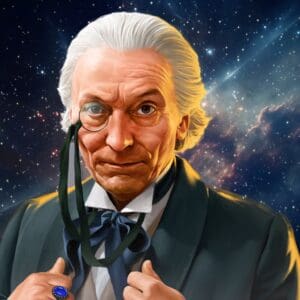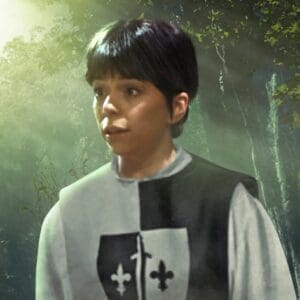
BBC Books
Salvation
Sets:
Past Doctor Adventures
Reviews and links from the Community
Review of Salvation by JeffreyMoo
Note: Review contains Mild Spoilers
This was my first foray into the Wilderness Years proper, and going in I had a couple things I was expecting, due to the reputation the Wilderness at large has gained. Among these was abstract, incomprehensible concepts that are only achievable on the written page, uncomfortable treatment of the female companions, and a brutality unseen in the classic show. I found many of these expectations met, however I also found something deeper, in the form of a really damn good story.
Now the plot itself is rather barebones. Not much actively happens throughout the book, and it doesn’t really pick up until late in the book. Hell, the TARDIS doesn’t even show up until around 50 pages in! However, this does not matter, as the strength of the book lies in its characters. Almost every character present is supremely interesting, both in who they are and how they react to the problems at hand, and each is fully explored within the pages allotted. The unique aspect awarded by prose of allowing the reader to get inside the characters heads helps immensely with this, and by novels end you fully understand how and why everyone is acting the way they do. A notable standout is Byron Carter, who has a slow, satisfying shift from a desperate, nervous wreck to a man with full faith in himself and his beliefs. His journey is exemplified by a beautiful monologue on the nature of creation delivered by the First Doctor, a monologue which is bound to stick in the mind of any who reads it.
The strength of character is not limited to the supporting cast, not at all, as our main characters all get a strong look in. That said, the story is never written from The Doctor’s perspective. He is always an outside force, existing through the perception of others. Despite this, he’s represented very well, and all his actions are completely understandable.
But the star of the show here is undeniably Steven. If, like me, you were disappointed by the show's handling of his emotions after The Massacre, this novel is for you. Diving into Stevens' head, we find a full understanding of his motivations, learn more of his past, find out his reasons for staying after the Massacre, and even lays the groundwork for his eventual exit in The Savages, something I had been unsatisfied with before now. And beyond all that, he even has a small, self-contained character arc of self forgiveness within the book, standing entirely on its own.
Despite all these praises, this is where an unfortunate criticism comes in, and that is of the novel’s treatment of Dodo. It makes an amicable effort at salvaging her character, providing a reason for her shifting accents and her blasé approach to time travel, leaving her former life behind. This is good, and it works, even playing into the threat's defeat at the end, but it has the unfortunate side effect of making her already poor exit in the War Machines even poorer, as she shows no signs she’d be willing to go back to London at any point in this book. But I guess that’s an external criticism, what’s on the page is fine. That is, except one thing.
Remember how I was expecting uncomfortable treatment of a female companion? Well, I got that right away, as in chapter 2, Dodo is the victim of an attempted sexual assault. It is then swiftly forgotten about in the next chapter, only mentioned in a few throwaway lines and not treated with the severity it requires. To make matters worse, the perpetrator of the assault is a major character that we are meant to sympathise with later on in the story! To be fair, the entity did not know what it was doing, believing the act to be a simple show of compassion between friends, however that does not make it sit anymore comfortably as a reader. I feel a less upsetting act should’ve been considered in it’s place, or just cut the altercation entirely, as as it stands it feels brutally out of place and casts an unfortunate shadow over the rest of the book.
If you (somehow) manage to look past that, you will find not only brilliant character work, but also an incredibly well written book. Steve Lyons takes to prose like a moth to a flame, writing numerous wonderful sequences throughout. Notable moments include the monologue mentioned earlier, a passage where a non-conscious non-material entity slowly forms a body and a mind written from the perspective of the entity, and a quiet landscape description contrasted by the remains of a massacre from the night before. A particular highlight of the book is chapter 9, where Lyons masterfully jumps between each character he’s explored so far, showcasing each of their unique reactions to the same scenario, before eventually the situation explodes in a cacophony of violence and dread.
All in all, it’s a good book, with fantastic character work, an interesting threat, and excellent writing talent, with an unfortunate shadow that makes it difficult for me to recommend. I do recommend it, as despite its failings, at its core it’s still really damn good
Community Ratings
* We are using ratings from third party sites for this story because we do not yet have enough ratings on TARDIS Guide. Please spread the word and rate the story!
(Updates coming soon:)
Add the last X members who rated it here
Add number of Favs, and who they are, here







